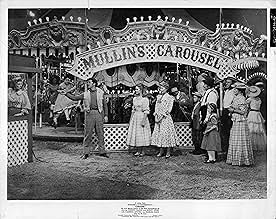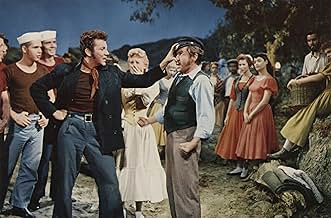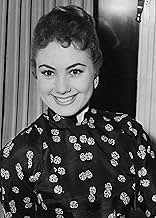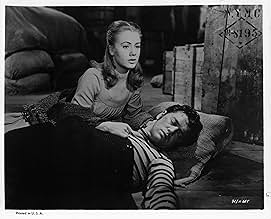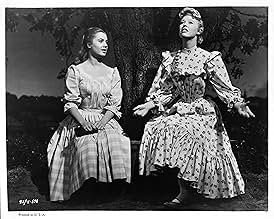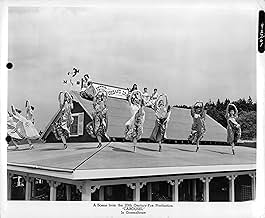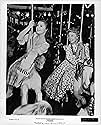Carousel
- 1956
- Tous publics
- 2h 8m
Fifteen years after his death, a carousel barker is granted permission to return to Earth for one day to make amends to his widow and their daughter.Fifteen years after his death, a carousel barker is granted permission to return to Earth for one day to make amends to his widow and their daughter.Fifteen years after his death, a carousel barker is granted permission to return to Earth for one day to make amends to his widow and their daughter.
- Awards
- 1 win & 3 nominations total
- Heavenly Friend
- (as William Le Massena)
- Louise's 'Starlight Carnival' Dancing Partner
- (as Jacques D'Amboise)
- Graduation Spectator
- (uncredited)
- Ruffian in Louise's Ballet
- (uncredited)
- Townsman
- (uncredited)
- Dancer
- (uncredited)
- Dancer
- (uncredited)
- Third Policeman
- (uncredited)
Featured reviews
The film begins in New England. A very impressionable young lady (Shirley Jones) sees a handsome rogue (Gordon MacRae) at the carnival and the two inexplicably fall in love and decide to marry. I say inexplicably because he is a real womanizer and NOT the type to ever settle down. As for the marriage, it is a disaster--mostly because he is a ne'er-do'-well who is afraid to work or commit himself to his lovely wife. At times, such as when he learns he's about to become a father, he commits to changing but invariably he ends up returning to his old ways. Now I was a bit uncomfortable about this, as he apparently slapped his bride around--but they made LOTS of excuses for it, such as saying 'he's under a lot of pressure' or 'I only hit her once'! So much for a film that will empower the women in the audience! I just couldn't get past the fact he was a jerk who died while trying to rob someone!
This story is apparently all part of some flashback. You see, MacRae's character is dead and he's telling this to the head honcho up in Heaven because he wants permission to return for one and only one brief period. Now considering most of the flashback consists of him acting like a clod, you wonder how this is all going to convince the powers that be to grant his request!
As for the music, it's decent but the film clearly lacks the crowd-pleasing tunes of many of Rogers and Hammerstein's other works. "South Pacific", "Oklahoma" and the rest had more memorable songs--and didn't have to work so hard to compensate for an unlikable lead. Here, it's an uphill battle. Pretty, well made...but still a film that I had a hard time liking. Overall, it looks good but fails. Watchable but among the least in the Rogers and Hammerstein canon.
The music is undoubtedly the finest Rodgers and Hammerstein
score.
Of the many fine moments in the film two astounding highlights
must be Billy's Soliloquy and the Shirley Jones' and Gordon
MacRae's lover's duet "If I loved you".
To this is added two great ballet sequences "June is Bustin' out all
Over" and Louise's ballet.
The film is Rogers and Hammerstein at their most dark and
introspective, which may account for the film's relatively lacklustre
reception at the time of its initial release but the at the same time
explains the ongoing appeal of this truly timeless classic film.
It is a fine memorial to both composer and lyricist and to the
artistry of Gordon MacRae whose performance of the soliloquy is
the benchmark against which all performances are judged.
The film was produced in Cinemascope 55 a large film fomat
which overcame many of the problems that were inherent in early
Cinemascope films (even though the film was actually released
only in standard 35mm form ..a bit like a 35mm print of a 70mm
film this still results in a far better image) and gives the film its
immaculate look.
The Fox DVD is crisp and the sound, though very clearly a 1950s
recording is clean and well balanced.
I just wish I could see this film in a cinema on the biggest of
screens... it would be an even more special experience!
Delightful performances from Barbara Ruick and Robert Rounseville as Mr. and Mrs. Snow. Their 'When The Children Are Asleep' is a charming highlight. Claramae Turner does an outstanding job on 'You'll Never Walk Alone'. Cameron Mitchell is a slyly villainous Jigger. Filming of the 'June Is Bustin' Out All Over' number in Boothsbay Harbor, Maine is a production highlight and choreographer's dream.
Gordon MacRae and Shirley Jones are in excellent voice for 'If I Loved You'. What more could you want? An exceptional movie musical that ranks with the best of Rodgers & Hammerstein's works.
The subject matter is darker than Oklahoma (the film version of which also starred MacRae and Jones) but the sheer exuberance of songs such as "June is Bustin' Out All Over"; "A Real Nice Clambake"; "When The Children Are Asleep" and "If I Loved You", plus of course the best-known song from the show, "You'll Never Walk Alone" takes the story to another level and makes this film enjoyable to watch. Robert Rounsville makes a fine bombastic Mr Snow and has a fabulous voice; MacRae and Jones have their memorable duet to the lovely melody of Rodgers' score. There is also an excellent dance sequence, not as extensive as on stage, but still effective, where the daughter of Billy and Julie imagines an escape from her lonely and ostracised life.
"Carousel" on film is not nearly as overwhelming. The story is still there, as are the songs, for the most part. But they are just songs in the movie, scenes distilled to the bare bones of the melody on which the original sequence was based. You don't get the feeling, after hearing them sung, that you have learned anything new about the characters (excepting, of course, Billy Bigelow's "Soliloquy" which is left entirely intact).
For example, the "If I Loved You" bench scene between Julie Jordan (Shirley Jones) and Billy Bigelow (Gordon MacRae) lasts almost fifteen minutes once the music starts. What the characters don't tell us about themselves, the music does, throwing melodies left and right until it finally culminates in the release of the famous love song. The scene has built up to this moment until it becomes the only way that Julie can tell Billy that she loves him. In the movie, however, it is all talk until Julie starts singing "If I Loved You". The song seems to come much more out of left field and does not seem nearly as satisfying. Billy repeats the song and the scene ends. As a result, their falling in love with each other doesn't make much sense because the scene really hasn't built up to it.
Several songs which delineate the supporting characters are either severely truncated (such as the musical/character sequence between Carrie Pipperidge (Barbara Ruick) and Enoch Snow (Robert Rounseville)) or cut entirely (such as "Blow High, Blow Low" which could have been a choreographer's dream). As for the choreography itself, surely "June is Bustin' Out All Over" could have been staged with a little more imagination instead of confining itself to the roof and deck of Nettie Fowler's spa. And it does feel confined. This is a song about abandoning the human spirit to the glories of the summer season, a feeling that covers much more territory than just a dining patio.
I do like the casting in the film, although I believe that they were badly underdirected. Gordon MacRae and Shirley Jones seem a little lost here. Their talent is not in question as evidenced by their stellar performances in the movie version of "Oklahoma!". Clearly this movie, which had the potential to be a cinema classic, was helmed by someone who didn't understand the genius of Rodgers and Hammerstein. In other words, don't try to fix what ain't broke.
Did you know
- TriviaThe film was not successful at the box office despite the positive reviews, but the soundtrack album became a national best seller.
- GoofsThe carousel has numerous colorful incandescent light bulbs. Thomas Edison introduced the first practical incandescent light bulb in 1879.
- Quotes
[last lines]
Dr. Selden: [at Louise's graduation ceremony] It's the custom at these graduations to pick out some old duck like me to preach at the kids. Well, I can't preach at you. I know you all too well. I brought most of you into the world, rubbed linament on your backs, poured castor oil down your throats. I only hope that now I got you this far that you'll turn out to be worth all the trouble I took with you. I - I can't tell you any sure way to happiness. I only know that you've gotta go out and find it for yourselves. You can't lean on the success of your parents. That's their success. And don't be held back by their failures.
Billy Bigelow: [to Louise] Listen to him. Believe him.
Dr. Selden: Makes no difference what they did or didn't do. You just stand on your own two feet. The world belongs to you as much as to the next fella, so don't give it up. And try not to be scared of people not liking you, just you try liking them. And just keep your faith, and your courage, and you'll turn out all right. It's like what we used to sing every morning when I was a boy. Maybe you still sing it: "When you walk through a storm, hold your head up high." You know that one?
Singers at graduation: [singing] And don't be afraid of the dark.
[they continue with the rest of the song]
Billy Bigelow: [to Louise, as the singing is still going on] Believe him, darling. Believe.
[Louise joins in the singing, and puts her arm around the girl sitting next to her, who reciprocates]
Billy Bigelow: [Walks over to Julie] I loved you, Julie. Know that I loved you.
[Julie smiles and joins in singing. As the song reaches its climax, Billy and the Heavenly Friend walk away from the graduation and up a hill. Billy then takes a last look toward the schoolyard and follows the Heavenly Friend]
Singers at graduation: [singing] Walk on, walk on, with hope in your heart/ And you'll never walk alone,/ You'll never walk alone!
- Crazy creditsA star hurtles downward and explodes in mid-air; out of this appears the credit "Twentieth Century-Fox presents Rodgers and Hammerstein's Carousel". The other credits all appear in a straightforward fashion.
- Alternate versionsIn the film's first two telecasts on ABC-TV in 1966, Mrs. Mullin's line "I don't run my business for a lot of sluts." followed by Carrie's retort "Who you calling a slut? Slut yourself!" and Julie says "Yeah, slut yourself!" was edited out. The line was kept on all local station telecasts of the film, and on all video releases.
- ConnectionsFeatured in King of the Movies (1978)
- SoundtracksThe Carousel Waltz
(1945) (uncredited)
Music by Richard Rodgers
Performed by the 20th Century-Fox Studio Orchestra Conducted by Alfred Newman
Details
- Release date
- Country of origin
- Language
- Also known as
- Rodgers and Hammerstein's Carousel
- Filming locations
- Boothbay Harbor, Maine, USA(scenes outside Nettie's Spa and in marina, including musical numbers "June Is Bustin' Out All Over" and "When The Children Are Asleep")
- Production company
- See more company credits at IMDbPro
Box office
- Gross worldwide
- $1,104
- Runtime2 hours 8 minutes
- Color
- Aspect ratio
- 2.55 : 1
Contribute to this page





